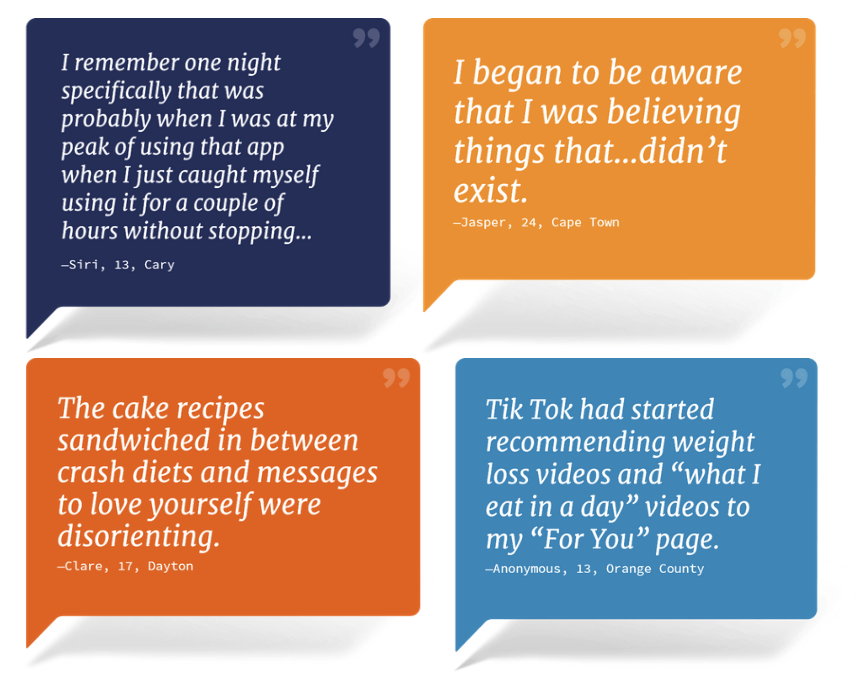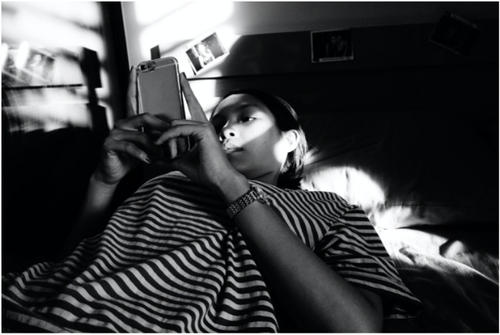Why is storytelling important to the movement for humane technology?

Social media has become dominant in our lives and our world. We’re told that it’s for having fun and making connections. But behind the likes, shares, and comments on social media, there are harmful experiences that are often hidden.
Take a look at these powerful stories from #MySocialTruth, a platform for young people to bring their voices to the movement for humane technology. Reading stories like these and sharing our own experiences can give us more insight into what is really happening on social media, and what changes we want to see.
What role does social media play in your life?
Social media platforms are shaped by a race for our attention to keep us engaged and change our behavior in exchange for profits. They’re built on technology that’s powerful enough to keep us scrolling and clicking without ever really taking a close look at what we’re doing.
To articulate your social media story, let’s first examine the role that social media plays in your life.

Take a look at the following questions. Write your answers without thinking about them too much. The more you focus on getting your thoughts out, the more you’ll learn about your experience. You can organize and clean them up later.
Take inventory of how you use social media:
- How many hours a day do you spend on social media?
- What apps do you use? Which do you use the most?
- What do you post on social media?
- What do you read and look at on social media?
Then, be honest with yourself about what you’re experiencing on a daily basis.
- How does social media make you feel?
- How do you think social media impacts your life for the better?
- How do you think social media impacts your life for the worse?
Some of our individual experiences may be positive: we may feel connected to a friend, feel validated when people love something we’ve created, or we might just have fun seeing what people are up to online.
But these positive experiences can also lead to something darker: a feeling of constant comparison or inadequacy, a need to constantly show that everything is good, struggles with isolation and mental health, or the feeling that we can’t log off even when we want to.
Social media has had some devastating effects for society. While each of our experiences are different, the fact is that these platforms are designed to compete for your attention, and can hijack our behavior to do so.
- How does this show up in your experience? How does it show up in the experience of those around you?
- Has taking a closer look at your experience inspired you to change how you use social media? To take action in different ways? If so, how?
How can I change the system with my story?

Sharing your story can have a real impact. Around the world millions of people are struggling to have healthy relationships with technology, and reading stories about that struggle can help people feel less alone and ashamed.
People in power are also watching: employees advocating for change in social media companies have been eager to read stories on MySocialTruth, as have members of Congress.
Company executives, board members, and investors often focus on the benefits of their products because that’s what is profitable. But your story can help to force them to consider the widespread harms that are often hidden in painful experiences that are never shared.
Stories with the deepest impact do the following:
- They tell a story or share anecdote(s)..
• For example: “Here’s when I started using the platform… here’s the impact it had… here’s what I’m struggling with about it now”
• For example: “Here’s when I started using a platform...here’s the impact it had….here’s what I’m doing about it.” - They include specific details that are personal to your experience, and help the reader understand what you went through.
- They focus on your experiences more than your opinions.
• While opinions are great, they should be shared in a way that’s connected to experience.
If you’re stuck or can’t think of a specific story, read other stories on MySocialTruth, or consider these prompts:
- Has there been a time where social media created resentment or communication challenges with your friends or family?
- How has social media influenced the way you relate to dating, love, and relationships?
- How has social media influenced the way you think of yourself?
- Think about posts you’ve made online that made you feel good. Think about posts online that you wish you could take back. What was the difference between these posts?
- Have you ever been a victim of cyberbullying? Have you been a cyberbully yourself?
- What would you tell your younger self before you started using social media?
- Have you seen or had experiences online with things that aren’t true?
- Have you taken a break from, quit, or changed the way you use social media? Why or why not?
Whatever your story, write it clearly with vivid details. Revise your story until you’re sure it is communicating what you mean for it to.
- When you are finished, you can share your story through a platform like MySocialTruth, which is gathering stories to push for change in Silicon Valley and Washington, D.C., or by getting involved in advocacy conversations through a group like Log Off, which is bringing together teens to rethink social media.
- As important as it is to share your story through these forums, sharing stories out loud with others in our classrooms, with friends, and in other group settings is just as valuable. Each time we share a story, we make it easier for others to understand the challenges we face, and we make it safer for others to share their own challenges. The more we learn about our collective struggles, the more we realize what’s at stake, and how urgently change is needed.
Remember that sharing stories requires bravery and vulnerability on the part of the storyteller and great listening from everyone else.
What’s next?
Our stories show the complexities of the attention economy and the specifics of our experiences. If we understand one person's story well, and we know large numbers of people experience the same thing, we can now see the larger story more clearly. To make sense of the frightening statistics about the impact of social media we must understand the human stories behind them.
Once you’ve shared your story and listened to the stories of others, take a step back and consider your experience. (If you’re working in a group, it may be helpful to answer these questions together):
- What trends do you notice across the stories that are being shared?
- What surprises you or stands out?
- In what ways do these stories represent experiences everywhere? In what ways do they not?
- What do these stories tell us about the future of technology? What do they tell us about the future of our society?
As long as hacking our attention is profitable, companies will continue to find more powerful ways to do it and these harms will continue to emerge. To change the system, we need to make our voices heard and understand that we’re not alone.
If sharing your story has inspired you to take action, you can:
Shift Your Tech Use: Make a successful change in how you use technology by setting goals and working with others.
Envision Humane Technology: Imagine the possibilities for humane technology by envisioning solutions that advance systemic change.